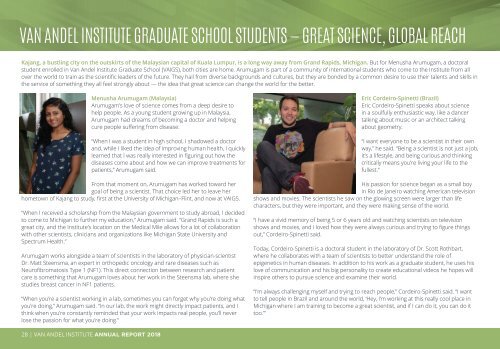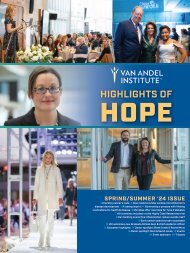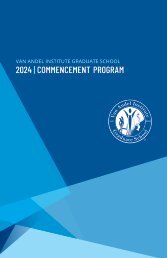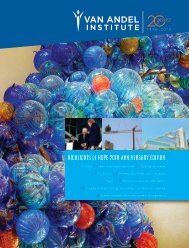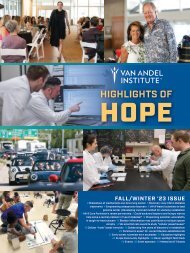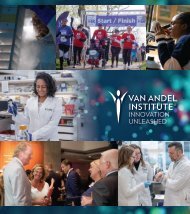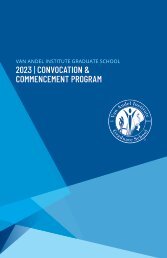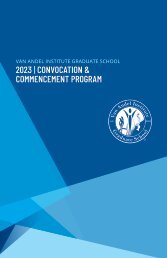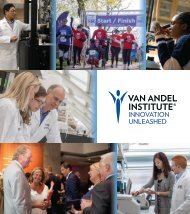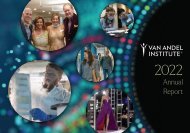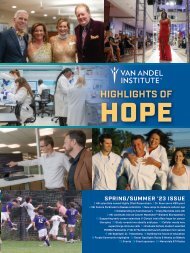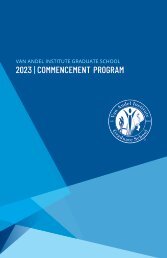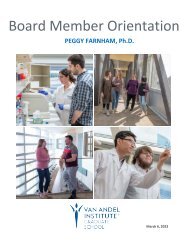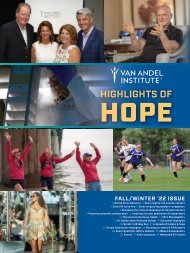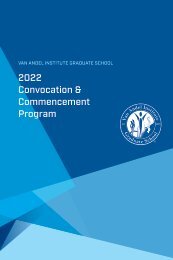2018 Annual Report
You also want an ePaper? Increase the reach of your titles
YUMPU automatically turns print PDFs into web optimized ePapers that Google loves.
VAN ANDEL INSTITUTE GRADUATE SCHOOL STUDENTS — GREAT SCIENCE, GLOBAL REACH<br />
RESEARCH<br />
Kajang, a bustling city on the outskirts of the Malaysian capital of Kuala Lumpur, is a long way away from Grand Rapids, Michigan. But for Menusha Arumugam, a doctoral<br />
student enrolled in Van Andel Institute Graduate School (VAIGS), both cities are home. Arumugam is part of a community of international students who come to the Institute from all<br />
over the world to train as the scientific leaders of the future. They hail from diverse backgrounds and cultures, but they are bonded by a common desire to use their talents and skills in<br />
the service of something they all feel strongly about — the idea that great science can change the world for the better.<br />
Menusha Arumugam (Malaysia)<br />
Arumugam’s love of science comes from a deep desire to<br />
help people. As a young student growing up in Malaysia,<br />
Arumugam had dreams of becoming a doctor and helping<br />
cure people suffering from disease.<br />
“When I was a student in high school, I shadowed a doctor<br />
and, while I liked the idea of improving human health, I quickly<br />
learned that I was really interested in figuring out how the<br />
diseases come about and how we can improve treatments for<br />
patients,” Arumugam said.<br />
From that moment on, Arumugam has worked toward her<br />
goal of being a scientist. That choice led her to leave her<br />
hometown of Kajang to study, first at the University of Michigan–Flint, and now at VAIGS.<br />
“When I received a scholarship from the Malaysian government to study abroad, I decided<br />
to come to Michigan to further my education,” Arumugam said. “Grand Rapids is such a<br />
great city, and the Institute’s location on the Medical Mile allows for a lot of collaboration<br />
with other scientists, clinicians and organizations like Michigan State University and<br />
Spectrum Health.”<br />
Arumugam works alongside a team of scientists in the laboratory of physician-scientist<br />
Dr. Matt Steensma, an expert in orthopedic oncology and rare diseases such as<br />
Neurofibromatosis Type 1 (NF1). This direct connection between research and patient<br />
care is something that Arumugam loves about her work in the Steensma lab, where she<br />
studies breast cancer in NF1 patients.<br />
“When you’re a scientist working in a lab, sometimes you can forget why you’re doing what<br />
you’re doing,” Arumugam said. “In our lab, the work might directly impact patients, and I<br />
think when you’re constantly reminded that your work impacts real people, you’ll never<br />
lose the passion for what you’re doing.”<br />
28 | VAN ANDEL INSTITUTE ANNUAL REPORT <strong>2018</strong><br />
Eric Cordeiro-Spinetti (Brazil)<br />
Eric Cordeiro-Spinetti speaks about science<br />
in a soulfully enthusiastic way, like a dancer<br />
talking about music or an architect talking<br />
about geometry.<br />
“I want everyone to be a scientist in their own<br />
way,” he said. “Being a scientist is not just a job,<br />
it’s a lifestyle, and being curious and thinking<br />
critically means you’re living your life to the<br />
fullest.”<br />
His passion for science began as a small boy<br />
in Rio de Janeiro watching American television<br />
shows and movies. The scientists he saw on the glowing screen were larger than life<br />
characters, but they were important, and they were making sense of the world.<br />
“I have a vivid memory of being 5 or 6 years old and watching scientists on television<br />
shows and movies, and I loved how they were always curious and trying to figure things<br />
out,” Cordeiro-Spinetti said.<br />
Today, Cordeiro-Spinetti is a doctoral student in the laboratory of Dr. Scott Rothbart,<br />
where he collaborates with a team of scientists to better understand the role of<br />
epigenetics in human diseases. In addition to his work as a graduate student, he uses his<br />
love of communication and his big personality to create educational videos he hopes will<br />
inspire others to pursue science and examine their world.<br />
“I’m always challenging myself and trying to reach people,” Cordeiro-Spinetti said. “I want<br />
to tell people in Brazil and around the world, ‘Hey, I’m working at this really cool place in<br />
Michigan where I am training to become a great scientist, and if I can do it, you can do it<br />
too.’”<br />
Wooyoung Choi (South Korea)<br />
Wooyoung Choi is both a scientist and an<br />
explorer. He has traveled to almost every<br />
country in Asia and has recently started to<br />
explore Canada and the United States. In 2016,<br />
he took the most significant trip of his life when<br />
he traveled to Grand Rapids after finishing<br />
his master’s degree at Tsinghua University<br />
in Beijing, China. Drawn to the Institute’s<br />
reputation for great science and intrigued by<br />
the opportunity to work with the Institute’s<br />
state-of-the-art cryo-electron microscope (cryo-<br />
EM), Choi decided to move halfway around the<br />
world to continue his studies at VAIGS.<br />
“I thought this was a great opportunity to be a<br />
part of an institute with this incredibly advanced technology and answer really complex<br />
biological questions,” Choi said. “I wanted to use this technology to better understand the<br />
structures of proteins, which can be used to understand mechanisms in cells and help<br />
develop new treatments.”<br />
Choi’s mentor at the Institute, Dr. Wei Lü, is an expert in cryo-EM and structural biology.<br />
Working and learning alongside a scientist with such a specialized focus is the opportunity<br />
of a lifetime.<br />
“Dr. Lü is very knowledgeable and experienced with using cryo-EM, and his enthusiasm<br />
for his work is incredible,” Choi said. “Everyone here is passionate about teaching me, and<br />
everyone I work with treats me like family. Being here is life-changing.”<br />
The close-knit bonds Choi has with his mentor and classmates helped him navigate the<br />
complexities of a new culture and new environment, and these relationships have helped<br />
him succeed in this new adventure.<br />
“People are really kind here and care about teaching me not just science but American<br />
culture. They really want me to learn,” Choi said. “I am happy to be at a graduate program<br />
that provides such great opportunities and lets me seek out and achieve my goals for the<br />
future.”<br />
Minge Du (China)<br />
On her family’s farm in China, Minge Du tended<br />
to the bountiful corn and wheat crops. As a<br />
child working directly with the natural world,<br />
Du developed a keen interest in animals and<br />
plants, that eventually led her to pursue a<br />
career in science.<br />
“I loved nature and animals when I was young,<br />
but I became really interested in science in<br />
college, where I studied a lot of biology,” Du<br />
said. “I have always been a very curious person<br />
and, while most of my family members are farmers, I decided I wanted to be a scientist.”<br />
Du began her graduate education in the U.S. at Stony Brook University in New York. There,<br />
she worked alongside Dr. Huilin Li, whose research uses cryo-EM to determine the<br />
structures of molecules. When Li accepted a position at the Institute, Du and her husband,<br />
who is also a scientist in Li’s lab, followed him to Grand Rapids.<br />
“I never imagined I would be in Grand Rapids, Michigan, but I am happy to be here<br />
because it’s such a good graduate school program,” Du said. “The size of the Institute<br />
allows students to work collaboratively and get to know each other, and that is very good<br />
for me.”<br />
Du’s work with Li focuses on uncovering the molecular structure of specific proteins using<br />
tools such as cryo-EM. Her experience at the Institute is unlike any she’s ever had, and she<br />
is excited to work with program peers who share her interest in technology and scientific<br />
discovery.<br />
“Every day, I am discussing newly published papers, working and collaborating with other<br />
scientists, and living a life much different than I ever expected,” Du said. “I am glad I am<br />
following my dreams.”<br />
VAN ANDEL INSTITUTE ANNUAL REPORT <strong>2018</strong> | 29


